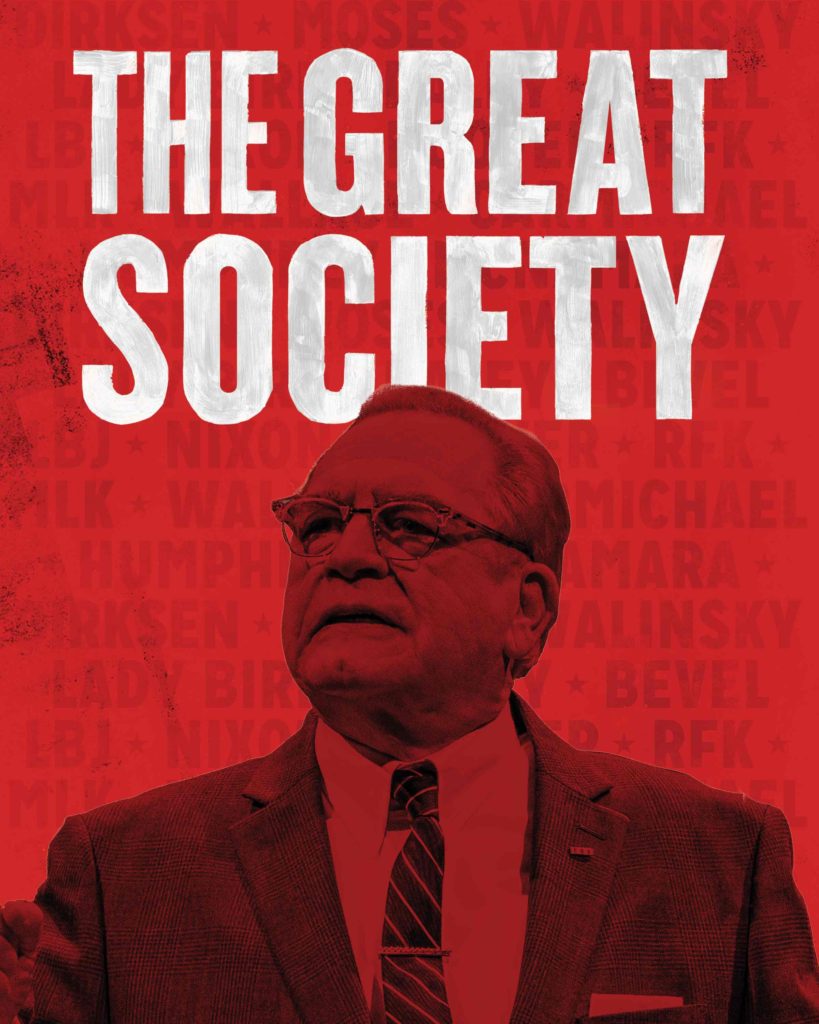INTERVIEW: Nikkole Salter on strengthening her own narrative in ‘Great Society’
Photo: Nikkole Salter stars in the Broadway premiere of The Great Society. Photo courtesy of the artist / Provided by Polk & Co. with permission.
The accomplished actor and writer Nikkole Salter has been on a journey these past few months — a journey that has afforded her the chance to connect the historical lessons of the Civil Rights Movement with the distressing realities of 2019. Her lens to make these connection is the new play The Great Society written by Robert Schenkkan and directed by Bill Rauch.
The expansive production continues Schenkkan’s look back at the presidency and influence of President Lyndon B. Johnson. The first installment, All the Way, played Broadway a few years ago and won Bryan Cranston a Tony Award. This next chapter, playing through Nov. 30 at Lincoln Center Theater’s Vivian Beaumont Theatre, stars Bryan Cox as the memorable president from Texas.
Salter, co-author and co-performer of In the Continuum, plays a number of characters on stage, including Coretta Scott King, the civil rights leader and wife of Martin Luther King Jr.
“It was quite a whirlwind and unconventional,” Salter said in a recent phone interview about her joining The Great Society company. “I was literally just offered the role on the strength of, I guess, my reputation, and I accepted because who says no to a Broadway gig.”
Before entering rehearsals, Salter conducted some research into the time period and its influential figures, though admittedly she was already well-versed on this important chapter in history. LBJ’s presidency was the time when the United States saw civil rights legislation approved in Washington, D.C.
“I learned a lot from this production,” Salter said. “I’m an African-American woman, so the Civil Rights Movement and this period of time was an important one to my personal narrative and to my family narrative and to my community’s narrative. So I did know a lot about it, which is why I guess I was so keen to accept the role. Who doesn’t want to pay homage to something that was so extraordinarily transformative in a positive way.”
In her research, Salter learned about King’s influence and the impact of Geraldine Whittington, executive assistant to LBJ. These are the two main characters that Salter portrays, in addition to a number of supporting roles throughout the show’s three-hour length.
“I found learning about Coretta Scott King incredibly informative in part because so much of the civil rights narrative is male-driven, and you don’t know about the contributions that women made from the beginning,” she said. “Reading her autobiography and preparing for her role was immensely informative about just how much it took from people of all walks of life to make the transformations that we witnessed happen actually come to fruition. I also didn’t know how educated she was and her perspective on all of the issues surrounding the Civil Rights Movement.”

Salter was interested in King’s personality, which she described as intentionally stoic. On Whittington, Salter was amazed by the professional successes in her life, especially given the climate in the United States at the time.
“Geraldine Whittington is the woman upon whom my character Sally Childress was loosely based, and because that period of time was such a period of struggle, you miss the narrative [about] people who are actually thriving and doing well, I guess, as well as society will permit them to,” Salter said. “I think for a black woman in the 1960s, Geraldine Whittington was doing extraordinarily well. She had completed her college degree in business administration. She had already had two federal appointments and had been poached by the president to be his executive assistant. I think that’s a narrative that would be respectable for someone of any walk of life during that time, but particularly for a black woman. I’m really enjoying having learned what I have learned about the people I embody.”
Salter said she appreciated that she has been given the opportunity to share a story about real women, and, in the case of Whittington, a story of a real woman who didn’t make the headlines. This was a time when male leaders dominated in their quest to change the fate of society, yet Salter’s portrayal reminds audiences of the dignity, leadership and sacrifice of those women who were also working toward change.
“I find the narrative that my particular story brings the play is important,” Salter said. “Our play is largely about leaders and the fight for freedom and equity and equality in our nation, but the story of Geraldine Whittington, aka Sally Childress, is the story of a regular person with a regular job and how she becomes disillusioned by her understanding of the machinations behind the politics of the policies that impact her life. So she goes from being a person who is extremely optimistic and hopeful about what LBJ’s administration will bring. … [We] see her come to understand the inner-workings of the White House and the inner-workings of the development of legislation and the introduction of the Vietnam War and her understanding of how those decisions get made, and she becomes disillusioned by all that. And I think that we are at a point in time when many, many Americans who maybe held a narrative of America as being a land of the free, home for the brave are being disillusioned. They’re being awakened to the way things really work.”
Salter said the silver lining amidst these lessons is that more people now comprehend how power is commandeered and negotiated. The truth, as she put it, is now on the map, and knowledge of that truth may be the tipping point for reform — both in the 1960s and in 2019.
Many of these important issues have been at the center of Salter’s work throughout her illustrious career. She has previously performed in Stick Fly, Head of Passes and Mud Row, and she has written a number of acclaimed works.
“As I’ve evolved as an artist and as a storyteller and evolved my understanding of this power, I find that I’m not just on target in the realm of my purpose, but I’m getting closer and closer to the bullseye,” she said. “My understanding of story and how it functions in society has evolved immensely. I mean, I started acting when I was 8, so I did it because I wanted to dress up and be pretty and get applause. But now here I am, and the story is the software of humanity. We actually can’t exist outside of the context of story. It is how we come to understand the world, and having the computer is useless unless you have some sort of programming. Your body as the hardware of life is useless without the consciousness and awareness that story brings, so the story that we tell ourselves about ourselves, about each other, about the world determine what we can do and will do.”
She added: “When you think about it that way, you see the egregious misrepresentation of the storyteller at large in our culture. … But I think someone got it right. I’m a child of Zelda Fichandler, who was the godmother of the non-for-profit theater movement, and one of the things that she used to say that I’ll paraphrase here is that there is a reason that theater exists in the same setup as schools and churches. … You don’t go to church to be entertained. You don’t go to school for pleasure. You hope that both of those things will be engaging in a way. You don’t want them to be boring. You want them to be ‘entertaining,’ but you go because you’re being nourished — socially, emotionally, intellectually. And theater/storytelling is like a sacred secular endeavor, and you should engage it to be nourished.”
The actor said that human beings are the only species on the plant that can direct their own evolution, and the power of individual narrative is how society focuses on collective conscious evolution.
“It’s like the kale need not be nasty to eat, but even if it is nasty, you should eat it,” she said. “The story need not be boring to be entertaining, but even if it is, you should engage it because it’s part of how you are nourishing yourself in our conscious, collective evolution.”
By John Soltes / Publisher / John@HollywoodSoapbox.com
The Great Society, featuring Nikkole Salter, plays through Nov. 30 at Lincoln Center Theater’s Vivian Beaumont Theatre on Broadway. Click here for more information and tickets.

